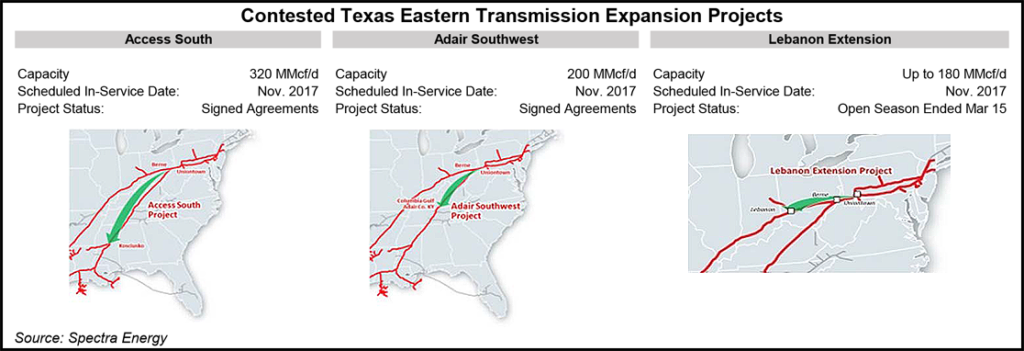Marcellus | E&P | NGI All News Access | Utica Shale
Three Tetco Proposals For Marcellus, Utica Pipes Targeted by Environmental Groups
A septet of regional environmental groups have asked FERC to expand its analysis of the potential impacts of three Texas Eastern Transmission LP (Tetco) projects designed to provide incremental pipeline transportation service from Appalachian shale fields to Midwest and Southeast markets.

According to the groups — the Allegheny Defense Project, Buckeye Forest Council, Center for Biological Diversity, FreshWater Accountability Project, Heartwood, Kentucky Heartwood, and Ohio Valley Environmental Coalition — the Federal Energy Regulatory Commission (FERC) “must take a hard look at the direct, indirect, and cumulative effects of the projects, including the effects of shale gas drilling in the Marcellus and Utica shale formations. FERC must also consider other connected, cumulative and similar actions in its environmental review of the projects.”
An objective review of the potential effects of Tetco’s Access South, Adair Southwest and Lebanon Extension projects would require FERC to prepare a programmatic environmental impact statement, rather than a less extensive environmental assessment (EA), the groups said. When Tetco asked FERC for approval to begin a pre-filing process of the projects earlier this year [PF15-17], it proposed to prepare and file an applicant-prepared draft EA with its application for the projects.
But, according to the environmental groups, fines imposed on Tennessee Gas Pipeline Co. LLC last year for violations of the Clean Streams Law during work on its 300 Line expansion project in north-central and northeast Pennsylvania (see Shale Daily, Dec. 24, 2014), and FERC’s failure to issue a stop work order during that construction, demonstrate “that there is considerable daylight between the assurances made in FERC’s EA’s and what actually occurs on the ground.
“…What, if anything, has changed in FERC’s procedures for mitigating impacts to waterbodies and wetlands? FERC cannot continue to allow companies and its staff to make broad, general assertions that mitigation plans and procedures will be adhered to in order to reduce impacts when there is evidence that such mitigation failed in the 300 Line Project and impacts to waterbodies and landowners continue as other projects are constructed.”
Tetco’s projects would create additional firm pipeline capacity necessary to deliver a combined 700,000 Dth/d for new incremental production from Appalachia to markets in the Midwest and Southeast along the Tetco system.
Access South would provide up to 320,000 Dth/d of capacity from a receipt point in Uniontown, PA to delivery points in Tetco’s Area Zone ELA and Market Zone M1 in Attala County, MS; Adair Southwest would provide up to 200,000 Dth/d from a receipt point in Uniontown West, PA, to delivery points in Tetco’s Market Zone M2 in Adair County, KY; and Lebanon Extension would provide up to 180,000 Dth/d of capacity from receipt points in Pennsylvania and/or Ohio to delivery points in Market Zone M2 near Lebanon, OH, Tetco said. The target in-service date for each of the projects is Nov. 1, 2017.
The environmental groups devoted an extensive part of their argument to the claim that FERC should consider indirect effects of Tetco’s proposals, which they said would include “a clear causal connection between the projects and shale gas development in the Marcellus and Utica shale formations,” and called on the Commission to “take a hard look at the cumulative impacts of gas drilling in the Marcellus and Utica shale formations.”
© 2024 Natural Gas Intelligence. All rights reserved.
ISSN © 2577-9877 | ISSN © 2158-8023 |
